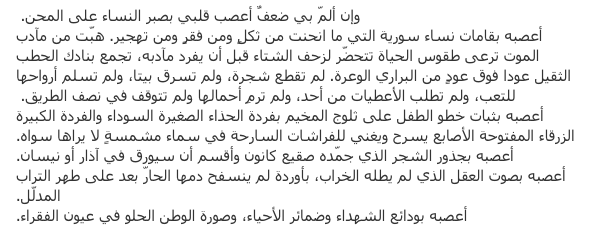Epilogue
When I Am Overcome with Weakness
by Najat Abdul Samad
When I am overcome with weakness, I bandage my heart with a woman’s patience in adversity.
I bandage it with the upright posture of a Syrian woman who is not bent by bereavement, poverty, or displacement as she rises from the banquets of death and carries on shepherding life’s rituals. She prepares for a creeping, ravenous winter and gathers the heavy firewood branches, stick by stick from the frigid wilderness. She does not cut a tree, does not steal, does not surrender her soul to weariness, does not ask anyone’s charity, does not fold with the load, and does not yield midway.
. . .
I bandage my heart with the determination of that boy they hit with an electric stick on his only kidney until he urinated blood. Yet he returned and walked in the next demonstration.
I bandage it with the steadiness of a child’s steps in the snow of a refugee camp, a child wearing a small black shoe on one foot and a large blue sandal on the other, wandering off and singing to butterflies flying in the sunny skies, butterflies and skies seen only by his eyes.
I bandage it with December’s frozen tree roots, trees that have sworn to blossom in March or April.
I bandage it with the voice of reason that was not affected by a proximate desolation.
I bandage it with veins whose warm blood has not yet been spilled on the surface of our sacred soil.
I bandage it with what was entrusted by our martyrs, with the conscience of the living, and with the image of a beautiful homeland envisioned by the eyes of the poor.
I bandage it with the outcry: “Death and not humiliation.
Translation: Ghada Alatrash

